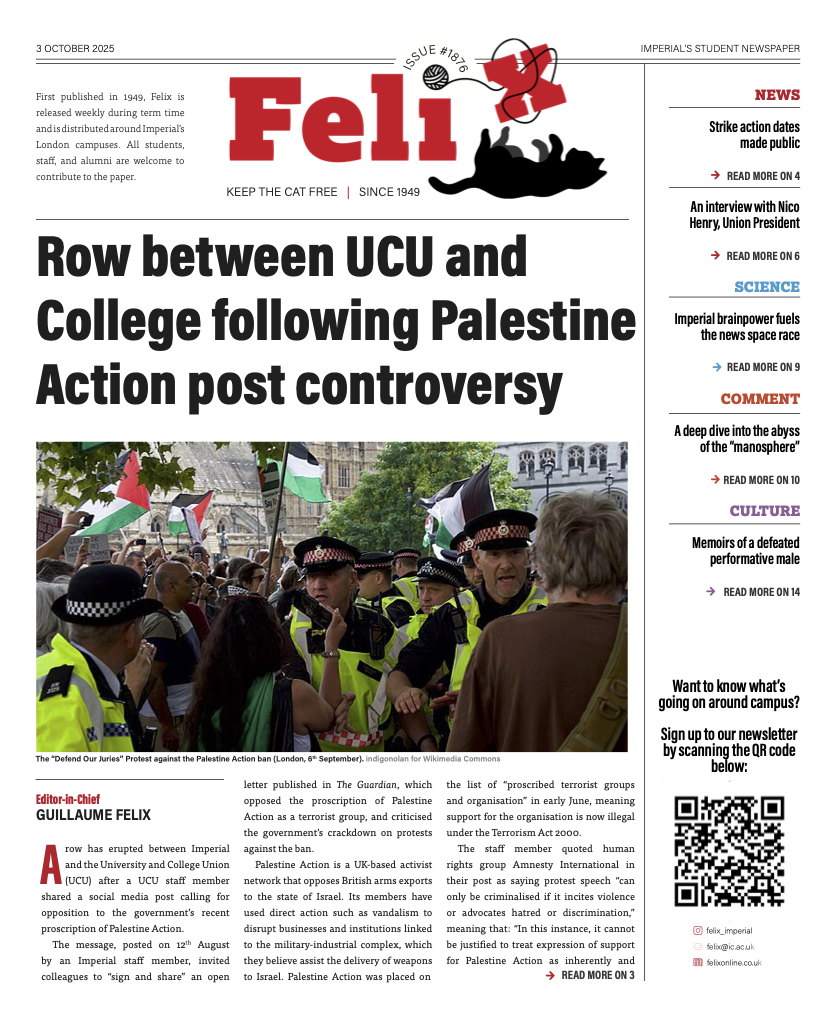Row between UCU and College following Palestine Action post controversy
A row has erupted between Imperial and the University and College Union (UCU) after a UCU staff member shared a social media post calling for opposition to the government’s recent proscription of Palestine Action.
The message, posted on 12th August by an Imperial staff member, invited colleagues to “sign and share” an open letter published in The Guardian, which opposed the proscription of Palestine Action as a terrorist group, and criticised the government’s crackdown on protests against the ban.
Palestine Action is a UK-based activist network that opposes British arms exports to the state of Israel. Its members have used direct action such as vandalism to disrupt businesses and institutions linked to the military-industrial complex, which they believe assist the delivery of weapons to Israel. Palestine Action was placed on the list of “proscribed terrorist groups and organisation” in early June, meaning support for the organisation is now illegal under the Terrorism Act 2000.
The staff member quoted human rights group Amnesty International in their post as saying protest speech “can only be criminalised if it incites violence or advocates hatred or discrimination,” meaning that: “In this instance, it cannot be justified to treat expression of support for Palestine Action as inherently and uniformly incitement.”
The post collected 16 “likes” from staff members on Viva Engage, the College’s local social media network, before it was taken down. Its content reflects the UCU’s stance on the controversy. A post on the trade union’s website from 9th July opines that the government is “completely wrong to have proscribed Palestine Action, a move which accelerates our slide into authoritarianism.”
According to a statement issued on 9th September by Dr Toby Andrew, the post’s author and those who upvoted it were threatened with disciplinary action from Imperial, under the scope of anti-terrorism laws. In a letter to the University’s Secretary and Registrar, Richard Martin, the UCU also alleged that a verbal warning was given to the original post’s author “outside any constituted process”.
The letter, signed by the UCU’s London Regional Support Official, Dr Amanda Sackur, rejected the idea that criticising the criminalisation of Palestine Action amounted to endorsing a terrorist group. Sackur denounced an “incorrect interpretation of the criminal law” and insisted that the post did not contravene the Terrorism Act.
“The post in question contains no expression of support for Palestine Action: it is entirely about the group’s proscription and Amnesty’s view about the UK’s obligations to protect the rights of freedom to expression and peaceful assembly.”
In an email consulted by Felix, Martin informed the UCU that Imperial did “not intend to amend its position” following the letter. He denied that the author of the post had been “disciplined”, instead affirming that they had been “spoken to informally” to raise “several issues” associated with the post. Martin explained that although only a court could judge whether the post contravened criminal law, at first sight there were reasons to believe it did, justifying its removal from Viva Engage and the interaction with the staff member.
Section 12 of the Terrorism Act reads: “A person commits an offence if the person – (a) expresses an opinion or belief that is supportive of a proscribed organisation, and (b) in doing so is reckless as to whether a person to whom the expression is directed will be encouraged to support a proscribed organisation.”
In her letter, Sackur had further warned that Imperial’s response “would create a disproportionate interference with the fundamental right to freedom of speech,” and urged the College to “uphold [academic freedom] at all times, especially in times of great controversy around political events and government policies.”
Martin said that no violation of free speech had occurred, since “prima facie evidence” that the post contravened meant that it was “not lawful free speech” and justified its removal. He added that, in addition to legal concerns, the post went against the College’s “stated position of ‘institutional neutrality’” under Imperial’s Freedom of Speech Code of Practice.
The UCU subsequently argued that removing the post was, in itself, a breach of institutional neutrality.
An Imperial College London spokesperson said: “Imperial is committed to freedom of speech and will take all reasonable steps to ensure that members of our community can express their views within the law. Imperial has a legal responsibility to ensure that its platforms not be used for unlawful activity, including demonstrating support for groups that have been proscribed by the UK Government.”
Separately, Imperial Friends of Palestine, a pro-Palestinian student organisation, have announced a new rally at Queen’s Lawn on Thursday 9th October, with the motto “End the genocide in Gaza – Stop arming Israel”. This “Day of Action” is supported by the UCU.









